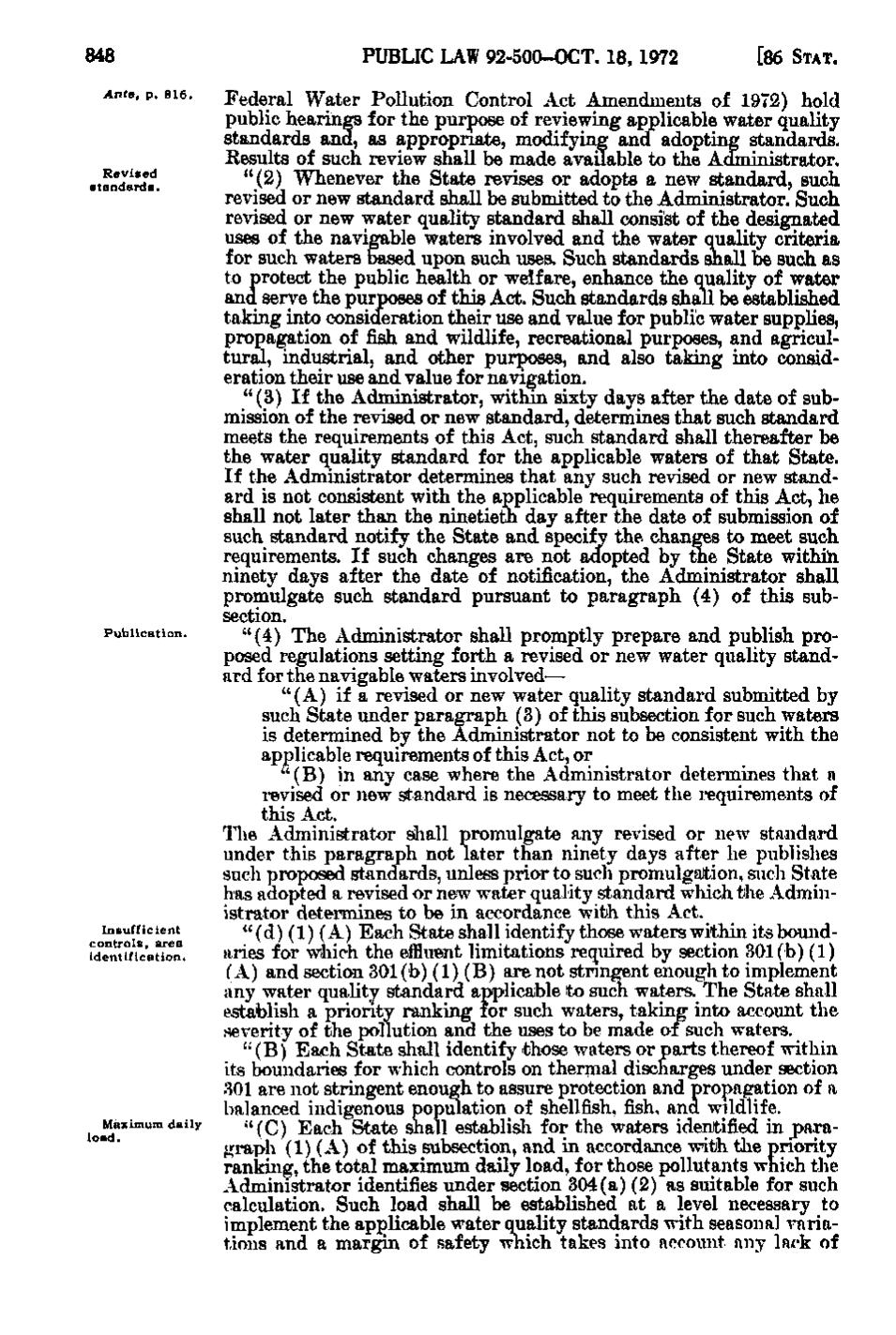848 Ante,
PUBLIC LAW 92-500-OCT. 18, 1972 p. 816.
Revised standards.
Publication.
Insufficient c o n t r o l s, area identification.
Maximum daily load.
[86 STAT.
Federal Water Pollution Control Act Amendments of 1972) hold public hearings for the purpose of reviewing applicable water quality standards and, as appropriate, modifying and adopting standards. Kesults of such review shall be made available to the A(hninistrator. "(2) Whenever the State revises or adopts a new standard, such revised or new standard shall be submitted to the Administrator. Such revised or new water quality standard shall consist of the designated uses of the navigable waters involved and the water quality criteria for such waters based upon such uses. Such standards shall be such as to protect the public health or welfare, enhance the quality of water and serve the purposes of this Act. Such standards shall be established taking into consideration their use and value for public water supplies, propagation of fish and wildlife, recreational purposes, and agricultural, industrial, and other purposes, and also taking into consideration their use and value for navigation. "(3) If the Administrator, within sixty days after the date of submission of the revised or new standard, determines that such standard meets the requirements of this Act, such standard shall thereafter be the water quality standard for the applicable waters of that State. If the Administrator determines that any such revised or new standard is not consistent with the applicable requirements of this Act, he shall not later than the ninetieth day after the date of submission of such standard notify the State and specify the changes to meet such requirements. If such changes are not adopted by the State withih ninety days after the date of notification, the Administrator shall promulgate such standard pursuant to paragraph (4) of this subsection. "(4) The Administrator shall promptly prepare and publish proposed regulations setting forth a revised or new water quality standard for the navigable waters involved— " (A) if a revised or new water quality standard submitted by such State under paragraph (3) of this subsection for such waters is determined by the Administrator not to be consistent with the applicable requirements of this Act, or " (B) in any case where the Administrator determines that a revised or new standard is necessary to meet the requirements of this Act. The Administrator shall promulgate any revised or new standard under this paragraph not later than ninety days after he publishes such proposed standards, unless prior to such promulgation, such State has adopted a revised or new water quality standard which the Administrator determines to be in accordance with this Act. ^' (d)(1)(A) Each State shall identify those waters within its boundaries for which the effluent limitations required by section 301(b)(1) (A) and section 301(b)(1)(B) are not stringent enough to implement any water quality standard applicable to such waters. The State shall establish a priority ranking for such waters, taking into account the severity of the pollution and the uses to be made of such waters. " (B) Each State shall identify those waters or parts thereof within its boundaries for which controls on thermal discharges under section 301 are not stringent enough to assure protection and propagation of a balanced indigenous population of shellfish, fish, and wildlife. " (C) Each State shall establish for the waters identified in paragraph (1)(A) of this subsection, and in accordance with the priority ranking, the total maximum daily load, for those pollutants which the Administrator identifies under section 304(a)(2) as suitable for such calculation. Such load shall be established at a level necessary to implement the applicable water quality standards with seasonal variations and a margin of safety which takes into account any lack of
�
